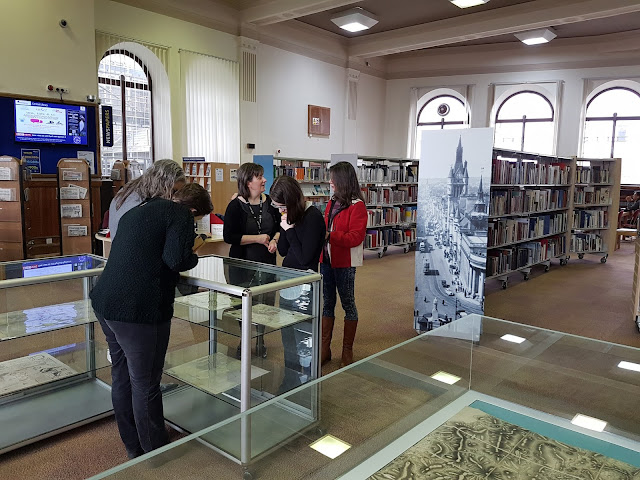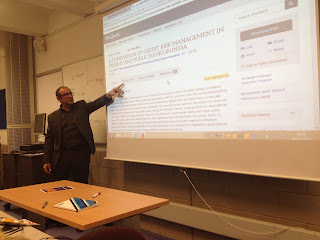Assessing the information needs of various groups: a few presentations
Assessing the information needs of various groups
A blog about the presentations our class gave during the Information Studies lab on the 8th of October.
As students attending Dr. Martzoukou’s module, Information Studies, we were asked to split into three groups, and present on topics given that day. The three topics presented covered refugees, musicians, and hobbies. Within a period of an hour, each group was to create a slideshow presentation with visuals and text, as well as present at the end of the time-frame. Based on the presentations, a vote was passed to determine which of the three was the most impressive. You can determine for yourself through the description of each presentation, which you believe would be the most interesting.Team A: The information needs of musicians
 |
| The first slide of Team A's Powerpoint |
We found that the content in these sources varied due to the difference in year of publication, with Kostagiolas' article containing more about information seeking behaviour and the use of the internet. For student musicians, the sources we found and used were Dougan, 'Information Seeking Behaviours of Music Students', References Services Review (2012) and Lesaffre, 'Music Information Retrieval: Conceptual Framework, Annotation and User Behaviour (2006).
We found that student musicians were more likely to rely on music instructors for information, which amateur musicians do not have available.
In our presentation, we also included Wilson's model of information seeking behaviour as we found that the information seeking behaviour of both amateur and student musicians followed this pattern of thought.
Team B: The information needs of refugees
 |
| The first slide of Team B's PowerPoint |
We then got to listen to Team B's presentation on the Information-seeking Needs of Refugees. They began by looking at how the Swedish School of Library & Information Science (2008) define refugees. This helped to provide an understanding of what kind of information the refugees may be searching for.
Group B chose to focus on the refugees staying in In-Transit Camps and discovered that there can be poor information flows between the refugees and the aid workers. They discussed Kitchen's (2016) beliefs in that more investment needs to be made in strategies that can help refugees make their own decisions. Moving on to look at the challenges that can be faced during resettlement, with pre-existing issues such as: language barriers, their experience of censorship and living with an oppressive government.
There are also problems faced in camp: food, water, healthcare, shelter, tracing their missing family members and misinformation. These could then lead to problems later where they may struggle in having access to information, social inclusion in any future employment or education and having the accessibility to opportunities with possible technological, linguistic and geographical issues.
Group B proposed some possible solutions to these issues in providing access to mobile information: SMS, Whatsapp etc. for contacting their existing acquaintances. Also, through the use of Humanitarian programmes having ambassadors from within the refugee population.
Team C: The information needs of hobbyists
The voting
After we had listened to the three presentation, we were tasked with determining which one of them was the best. To do this, we were given a piece of paper on which we could record our vote, as well as write down some feedback. Voting for your own team was not allowed, of course.
Team C came in first place in the voting with a whopping nine votes, out of a class of fifteen! Some of the praise written on the votes for this group called their presentation 'interesting and memorable', 'relatable and humorous', and 'interesting and informative'. The group was also praised for the diverse approach they took to their topic by examining multiple different types of hobbyists.
Team A got four of the remaining six votes, and thereby came in second. One voter said that the presentation had plenty of content and was in depth, while another simply stated 'Good job'! One other voter wrote that they found it helpful how team A related their practical analysis of users' information needs to the theoretical Wilson model of information seeking behaviour that had been discussed in the lecture that day, as the practical examples helped them understand the model better.
Team B brought up the rear in the voting with the final two votes. One of the voters described the presentation as 'very informative and concise' , and praised it for implying practical solutions for the problems it described. The other person who voted team B was being a bit cheeky, and wrote on their ballot that their own team was actually the best, but still praised team B for their fun and well-thought out presentation.
At the end of the day, the voting and the winning was not what this exercise was about. What it was about was us learning about how different kinds of users have different kinds of needs when it comes to finding information. This is a lesson that will surely come in handy for all of us, as for our assessment for this course we will need to assess the needs of a user once again. This exercise was fun and educational, and we enjoyed listening to everyone's presentations!
References
Team A
Dougan, K. (2012) ‘Information seeking behaviors of music students’, Reference Services Review, 40(4), pp. 558–573. doi: 10.1108/00907321211277369.
Kostagiolas, P.A., Lavranos, C., Korfiatis, N. and Papadatos, J. (2015) ‘Music, musicians, and information seeking behavior: A case study on a community concert band’, Journal of Documentation, 71(1), pp. 3–24. doi: 10.2139/ssrn.2285003.
Lesaffre, M. (2006) ‘Music information retrieval: conceptuel framework, annotation and user behaviour’, Ghent University. Faculty of Arts and Philosophy,.
Narveson, L. (1999) ‘THE INFORMATION NEEDS AND SEEKING BEHAVIORS OF AMATEUR MUSICIANS: A QUALITATIVE STUDY’, University of North Carolina Press,.
Wilson, T.D. (1999) ‘Models in information behaviour research’, Journal of Documentation, 55(3), pp. 249–270
Team BReferences
Team A
Dougan, K. (2012) ‘Information seeking behaviors of music students’, Reference Services Review, 40(4), pp. 558–573. doi: 10.1108/00907321211277369.
Kostagiolas, P.A., Lavranos, C., Korfiatis, N. and Papadatos, J. (2015) ‘Music, musicians, and information seeking behavior: A case study on a community concert band’, Journal of Documentation, 71(1), pp. 3–24. doi: 10.2139/ssrn.2285003.
Lesaffre, M. (2006) ‘Music information retrieval: conceptuel framework, annotation and user behaviour’, Ghent University. Faculty of Arts and Philosophy,.
Narveson, L. (1999) ‘THE INFORMATION NEEDS AND SEEKING BEHAVIORS OF AMATEUR MUSICIANS: A QUALITATIVE STUDY’, University of North Carolina Press,.
Wilson, T.D. (1999) ‘Models in information behaviour research’, Journal of Documentation, 55(3), pp. 249–270
‘Lost: Syrian refugees and the information gap.’; www.reliefweb.int; 6 October 2016
Lloyd et al; Connecting with new information landscapes: information literacy practices of refugees; Emerald Insight.



Comments
Post a Comment